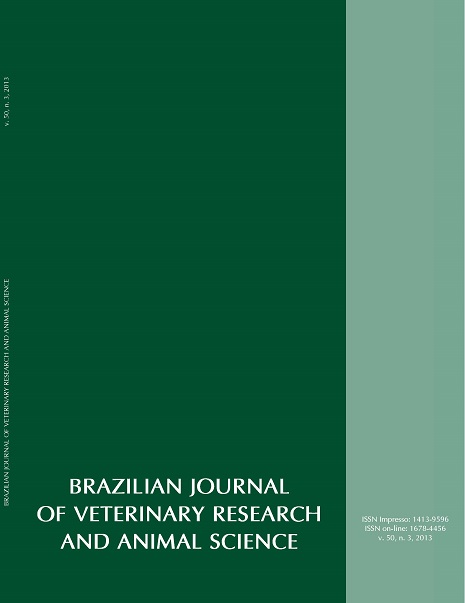Lamelar keratoplasty in dogs using equine amniotic membrane. Clinical and morphological study
DOI:
https://doi.org/10.11606/issn.1678-4456.v50i3p211-219Keywords:
Cornea, Dogs, Amniotic membrane, Veterinary ophthalmologyAbstract
Amniotic membranes have been successfully used in the treatment of superficial corneal diseases. The purpose of this study was to assess the feasibility of use of equine amniotic membrane (AM) in lamellar keratoplasty of dogs. Amniotic membranes were preserved in glycerol (98%). Implant efficacy was assessed by clinical evaluation, time of healing, inflammatory response, and the corneal architectural configuration. Twelve dogs were divided into four groups of three animals. In each animal, a 5-mm diameter lamellar keratectomy was performed, and followed by implantation of the AM. The animals were evaluated at the 2th, 7th, 21th, and 40th days after surgery. During this period, ophthalmological exams were performed at 48-h intervals, and the animals were euthanized after the last evaluation. The eyes were enucleated, included, fixed, and stained with hematoxylin-eosin (HE), periodic acid-Schiff (PAS), and picrosirius. Epithelization of the implants was completed in about ten days after surgery. New vessels progressively diminished from 21 days on, were not detected on day 40 after surgery, and only a nebula was observed in the implant area. Optical microscopy revealed a mild inflammatory response, presence of squamous epithelium on day seven, and total epithelization on day 21 after surgery. On day 40, the basal epithelial membrane was shown to be reformed. Therefore, we conclude that use of equine amniotic membranes is feasible as implant for dog cornea since it is incorporated to the corneal stroma, and a relative transparency can be obtained.Downloads
Download data is not yet available.
References
Downloads
Published
2013-06-21
Issue
Section
UNDEFINIED
License
The journal content is authorized under the Creative Commons BY-NC-SA license (summary of the license: https://
How to Cite
1.
Barbosa A, Barros PS de M, Guerra JL, Otsuki DA. Lamelar keratoplasty in dogs using equine amniotic membrane. Clinical and morphological study. Braz. J. Vet. Res. Anim. Sci. [Internet]. 2013 Jun. 21 [cited 2026 Feb. 6];50(3):211-9. Available from: https://revistas.usp.br/bjvras/article/view/64593





